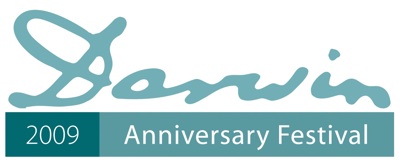Harold Varmus, Darwin and Modern Science, Thurs 9 July
Duration: 31 mins 19 secs
Share this media item:
Embed this media item:
Embed this media item:
About this item

| Description: |
Darwinian ideas about cancer
Professor Harold Varmus (Memorial Sloan-Kettering Cancer Centre, New York, USA) Summary: Charles Darwin’s ideas about natural selection were developed through meticulous observations about species variation, based on the appearance and behaviour of intact organisms and their visible components. Advances during the past century in cell biology, molecular biology, genetics and pathology have produced new ways to apply Darwinian principles to diseases, especially infectious diseases and cancers. Mutations (genetic variations) are the underlying events in cancers; some of these are inherited, but most are somatic (occurring after birth). Selection for cells that bear such cancer-predisposing or cancer-causing mutations is based on a growth advantage. This favours the cells at the expense of the organism (which commonly dies from the cancer), raising interesting questions about why certain cancer-predisposing versions of genes (alleles) persist in human populations. In addition, because cancer cells are usually found to have multiple mutations, additional Darwinian questions arise: ‘Is the rate of variation (mutation) higher in cancer cells than in normal cells?’ ‘If so, is the higher rate due to defects in mechanisms, such as DNA repair, that normally protect our chromosomes from damage during life?’ ‘Do cells that undergo sequential mutations also undergo selection in the context of a tumour, producing an evolutionary process that favours the dominance of the most aggressively growing cells?’ ‘And what are the biological (phenotypic) consequences of the mutations that favour selection?’ These problems are further compounded by the use of modern therapies, including radiotherapy, chemotherapy and so-called targeted therapy. In each case, cells that undergo further mutations may gain an additional selective advantage if they become resistant to the therapy – yet another form of Darwinian evolution in the context of a major disease and one that demands the immediate attention of the research community to find new treatment strategies. |
|---|
| Created: | 2009-10-15 16:12 |
|---|---|
| Collection: | Darwin Festival 2009 |
| Publisher: | University of Cambridge |
| Copyright: | University of Cambridge, Darwin Festival 2009 |
| Language: | eng (English) |
| Distribution: |
World
|
| Keywords: | Darwin; evolution; Harold; Varmus; cancer; oncogenes; Clinton; president; Noble; Prize; president; Obama; behaviour; molecular; biology; genetics; pathology; infectious; diseases; selection; variation; mutation; chromosomes; damage; tumor; |
| Explicit content: | No |
| Aspect Ratio: | 4:3 |
| Screencast: | No |
| Bumper: | /sms-ingest/static/new-4x3-bumper.dv |
| Trailer: | /sms-ingest/static/new-4x3-trailer.dv |
| Abstract: | Biography: Harold Varmus is a physician-scientist (trained at Amherst College, Harvard, Columbia and the National Institutes of Health), who shared the 1989 Nobel Prize in Medicine with his colleague at the University of California, San Francisco, J Michael Bishop, for their discovery of cellular oncogenes. He served as Director of the National Institutes of Health in the Clinton Administration, co-founded the Public Library of Science, and is now President of Memorial Sloan-Kettering Cancer Center and a Co-chair of President Obama’s Council of Advisors on Science and Technology. His memoir, The Art and Politics of Science, was recently published by WW Norton.
|
|---|---|
Available Formats
| Format | Quality | Bitrate | Size | |||
|---|---|---|---|---|---|---|
| Flash Video | 320x240 | 263.19 kbits/sec | 60.37 MB | View | Download | |
| iPod Video | 480x360 | 505.58 kbits/sec | 115.97 MB | View | Download | |
| QuickTime (for download) | 384x288 | 790.08 kbits/sec | 181.22 MB | View | Download | |
| QuickTime (for streaming) | 480x360 | 908.52 kbits/sec | 208.39 MB | View | Download | |
| MP3 | 44100 Hz | 125.06 kbits/sec | 28.47 MB | Listen | Download | |
| Audio Interchange File Format (AIFF) | 1.34 Mbits/sec | 313.89 MB | Listen | Download | ||
| RealMedia | 878.52 kbits/sec | 201.51 MB | View | Download | Stream | |
| Auto * | (Allows browser to choose a format it supports) | |||||

